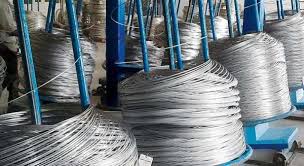Stainless wire is a crucial material used in various industries due to its unique combination of strength, durability, and resistance to corrosion. Whether in construction, automotive, aerospace, or even medical applications, pvc coated stainless wire rope plays a vital role in ensuring the functionality and longevity of many products.
Composition and Types
Stainless wire is typically made from stainless steel, an alloy primarily composed of iron, chromium, and often nickel. The chromium content is essential as it forms a protective layer of chromium oxide on the surface, which prevents rust and corrosion. Stainless steel can be categorized into several types based on its composition and structure:
- Austenitic Stainless Steel: Known for its high corrosion resistance and good formability. Common grades include 304 and 316.
- Ferritic Stainless Steel: Less ductile but offers excellent resistance to stress corrosion cracking. Common grades include 430 and 446.
- Martensitic Stainless Steel: Known for its high strength and hardness. Common grades include 410 and 420.
- Duplex Stainless Steel: Combines the properties of both austenitic and ferritic stainless steels, offering high strength and excellent corrosion resistance.
Applications
The versatility of stainless wire makes it suitable for a wide range of applications:
- Construction: Stainless wire is used in reinforcing concrete, creating wire mesh for fences, and in architectural features. Its resistance to rust and degradation makes it ideal for both structural and decorative purposes.
- Automotive Industry: Stainless wire is employed in various automotive components, including exhaust systems, springs, and electrical connections. Its ability to withstand high temperatures and corrosive environments is crucial for these applications.
- Aerospace: In aerospace, stainless wire is used in critical components like aircraft cables and hydraulic lines. The material’s strength-to-weight ratio and resistance to extreme conditions make it a preferred choice.
- Medical Devices: The biocompatibility and sterilizability of stainless wire make it suitable for medical applications such as surgical instruments, stents, and implants.
- Consumer Products: Stainless wire is also used in everyday items like kitchen utensils, jewelry, and household appliances, where durability and resistance to tarnishing are important.
Advantages
Stainless wire offers several benefits, including:
- Corrosion Resistance: The chromium oxide layer protects the wire from rust and other forms of corrosion, making it suitable for use in harsh environments.
- Strength and Durability: Stainless wire maintains its strength over time, even under mechanical stress or extreme temperatures.
- Aesthetic Appeal: The shiny surface of stainless wire is visually appealing and easy to maintain, making it a popular choice for decorative applications.
- Low Maintenance: Unlike other metals that may require frequent coating or replacement, stainless wire needs minimal upkeep.
Conclusion
Stainless wire’s exceptional properties—corrosion resistance, strength, and durability—make it an indispensable material across numerous industries. From reinforcing structures to enhancing consumer products, stainless wire continues to play a significant role in advancing technology and improving the quality of everyday items. Its versatility ensures that it will remain a key component in various applications for years to come.

